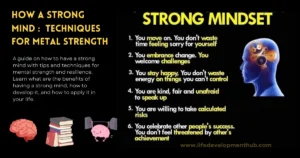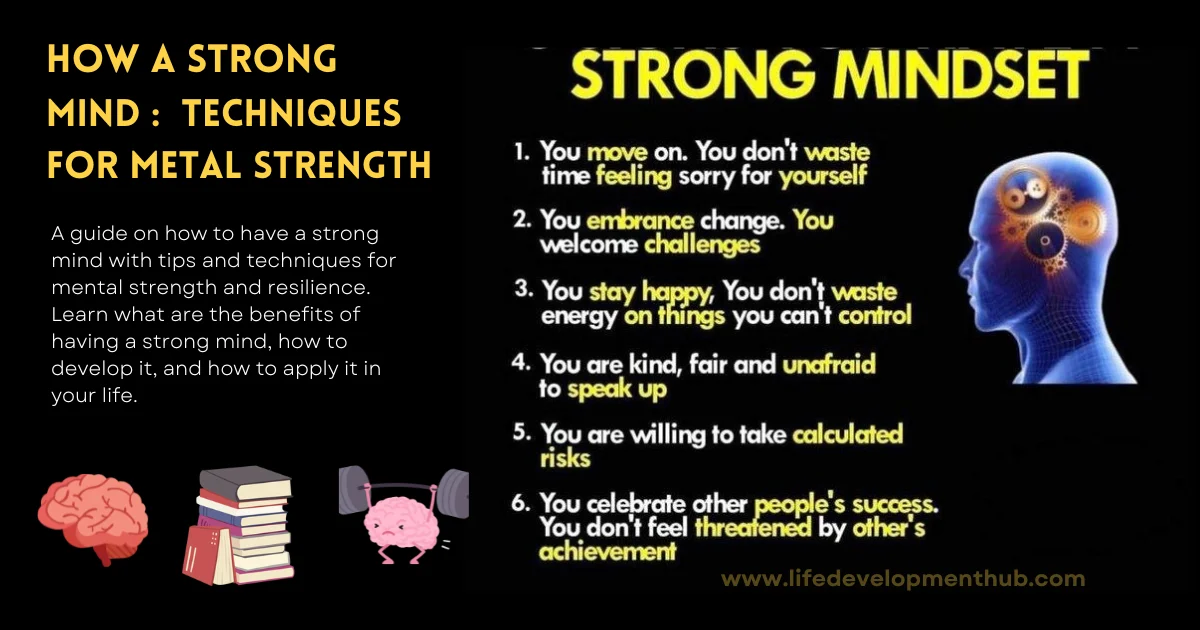A guide on how to have a strong mind with tips and techniques for mental strength and resilience. Learn what are the benefits of having a strong mind, how to develop it, and how to apply it in your life.
Are you seeking a strong mind that can overcome challenges, cope with stress and achieve your goals? To build mental strength and resilience that will aid every aspect of life? If that is the case for you, read this article.
Mental strength and resilience refers to your capacity for dealing with challenges, dealing with difficulties, adapting to change and remaining strong despite difficult times. They’re not fixed traits but skills which can be learned and developed – research shows mental resilience has many health, emotional well-being and performance benefits for you.
In this article, we will present some tips and techniques that can help build a stronger mind. Additionally, we’ll show examples of how they can be implemented into daily life.
What Are My Strategies and Techniques for Fostering a Strong Mind?
There are a range of techniques and tips that can assist in developing a strong mind, but here are a few of the more prevalent and efficient ones:
Negative thoughts can make us feel bad, doubt ourselves or give up altogether. They can be caused by external events or internal beliefs; to challenge negative thoughts it’s essential to identify them, question them and then replace them with more realistic and positive ones – for instance if someone says, “I can’t do this”, asking themselves “Is this true? What evidence exists to back this claim up and how can they improve themselves then saying: “I believe in myself if I work hard and learn from my mistakes”.
– Practice gratitude. Gratitude is the feeling of appreciation for what has been given or done for us, and cultivating it can help focus our thoughts on positive aspects of life while simultaneously decreasing stress levels and increasing happiness. You can do this by writing three things you are thankful for each day or thanking those who have contributed positively – words or actions will do just fine to express gratitude!
Set SMART goals. These goals should be Specific, Measurable, Achievable, Relevant and Time-bound in nature and help clarify your vision, track progress and motivate yourself. In order to set SMART goals you need to outline what it is that you hope to accomplish; how it will be measured; why it matters and when the goal will be accomplished.
– Gain New Skills. Gaining new skills can expand your knowledge, enhance your abilities and boost your confidence. Learning can also stimulate the brain, enhance creativity and prevent boredom – to learn them you could enroll in a course, read a book or watch a video or join a club or community that interests you.
– Reach Out. Reaching out can help reduce stress, overcome challenges and achieve goals more easily; strengthen relationships and social skills; or deepen social bonds. When seeking support you could turn to someone such as friends, family members, mentors, coaches or support groups – seeking assistance can also strengthen social bonds between people if need be. To do so you may reach out for support to friends, family, mentors or coaches as you could have support available from all these sources if desired.
Consult a counselor, join a support group, or submit questions online forums for advice or feedback.
How Can You Apply the Tips and Techniques Toward Your Daily Life?
If you want to incorporate tips and techniques in your everyday life, here are a few steps you can take:
Read The Power of Mental Strength by Amy Morin or watch some videos related to it, then find one or two tips or techniques that resonate most with you and start practicing them regularly. Finally, keep track of your results using tools such as apps, journals or calendars and record your feedback from them.
– Seek feedback and support from people who share your goals or values.
Keep learning and improving yourself.
Q: What is the Difference between Mental Strength and Mental Health? A:

A: Mental strength refers to our capacity for managing challenges, stress and change while mental health refers to an overall state of well-being in which an individual can fully realize their potential while managing normal stresses of daily living.
Mental strength and mental health are not interchangeable – although both may affect productivity in their workplaces and impact communities positively. Mental strength can influence mental health; vice versa; improving one can positively impact both.
Q: Who are some examples of people with strong minds?
A: People with strong minds include:
Nelson Mandela, former President of South Africa who spent 27 years in prison for fighting apartheid, emerged as a symbol of peace and reconciliation; Malala Yousafzai, one of Malala Yousafzai’s many admirers;
Nobel Peace Prize recipient Malala, who survived being shot by Taliban for advocating girls’ education and has continued her fight for human rights. Stephen Hawking was another outstanding scientist who lived with motor neuron disease that paralyzed him and limited his speech ability.
Scientists and engineers alike have made major advances in science through groundbreaking discoveries and contributions made.
Q: How can I assess my mental strength and resilience?
A: There are various tools and tests that can help assess mental strength and resilience, such as:
– The Resilience Scale measures your ability to deal with stress and rebound from setbacks, as well as cope with life’s obstacles.
The Mental Toughness Questionnaire measures confidence, commitment, challenge, and control while The Grit Scale assesses passion and perseverance toward long-term goals.
Conclusion
Building a strong mind is a skill that can help you excel at life by overcoming challenges, managing stress, and reaching goals. To develop this strength you can implement some tips and techniques such as challenging negative thoughts, practicing gratitude, setting SMART goals, learning new skills, seeking support or reading Amy Morin’s The Power of Mental Strength book as a starting point and practicing them regularly while tracking results and receiving feedback, seeking feedback and support from others and continually growing and developing yourself.

